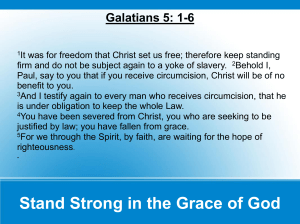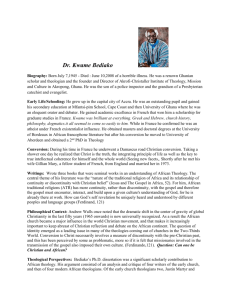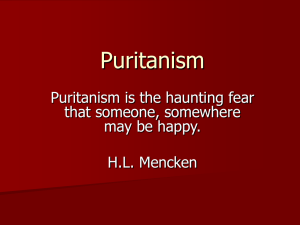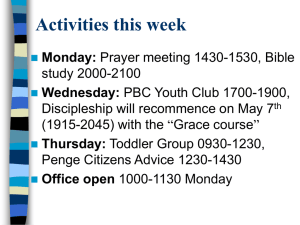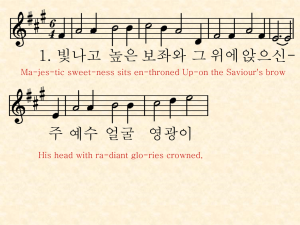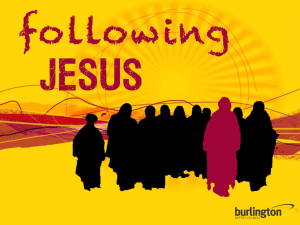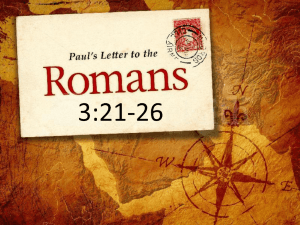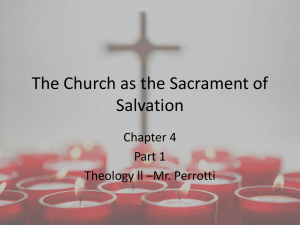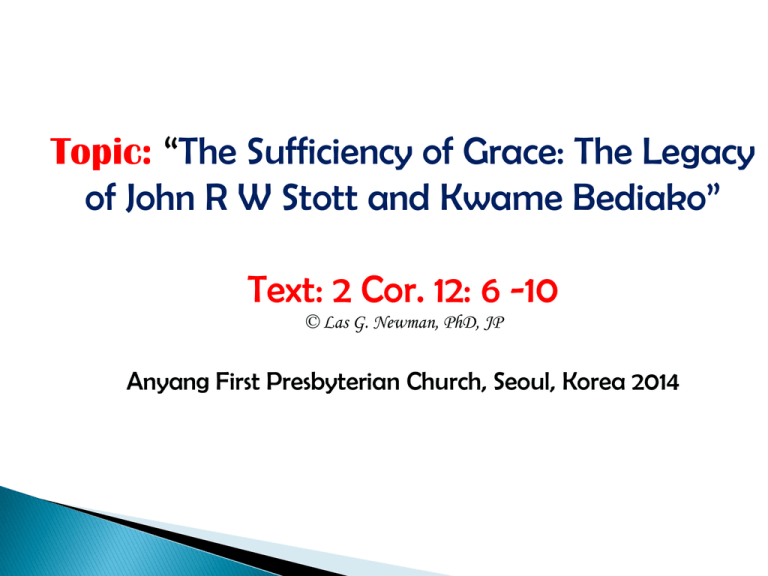
Topic: “The Sufficiency of Grace: The Legacy
of John R W Stott and Kwame Bediako”
Text: 2 Cor. 12: 6 -10
© Las G. Newman, PhD, JP
Anyang First Presbyterian Church, Seoul, Korea 2014
On behalf of the
INFEMIT NETWORKING TEAM
and
THE STOTT-BEDIAKO FORUM 2014
Thank you for your warm welcome and
gracious hospitality.
INFEMIT NETWORKING TEAM
RUTH PADILLA DEBORST (Costa Rica/INFEMIT Latin America), Coordinator of the
Networking Team
AL TIZON (USA/INFEMIT USA). Associate Professor of Holistic Ministry, Palmer
Theological Seminary of Eastern University in Philadelphia, Pennsylvania, USA. He is also the
co-President of Evangelicals for Social Action, USA.
WONSUK MA (UK/INFEMIT Asia). Director of the Oxford Centre for Mission Studies,
David Yonggi Cho Research Tutor of Global Christianity.
LAS NEWMAN (Jamaica/INFEMIT Caribbean), President of the Caribbean Graduate
School of Theology in Kingston, Jamaica.
CORNELIU CONSTANTINEANU (Romania/INFEMIT Europe) Professor of Theology,
Institutul Teologic Penticostal (Pentecostal Theological Institute) in Bucharest,
BENHARDT QUARSHIE (Ghana/INFMIT Africa). Rector of the AkrofiChristaller Institute of Theology, Mission and Culture in Akropong-Akuapem, Ghana,
Secretary - General of the African Theological Fellowship.
PAUL JOSHUA (India/INFEMIT Asia). Professor of Theology at the South
Asia Institute of Christian Studies (SAICS), Bangalore, India.
MARCELO VARGAS (Bolivia/INFEMIT Latin America). Secretary-General of
the Latin American Theological Fellowship and the Director of the Centro de
Capacitación Misionera (Training Center for Mission) in La Paz, Bolivia.
MUNTHER ISAAC (Bethlehem/INFEMIT Middle East & North Africa). is Vice
Academic Dean at Bethlehem Bible College.
MENCHIT WONG (Philippines/INFEMIT Asia). International Director for Child
Advocacy, Compassion International.
CHRIS WILSON (USA) serves as the INFEMIT Executive Assistant and Technical
Support
We are here in Seoul to reflect on
the life and legacy of two men of
God who have made significant
contributions to the Global Church in
the 20th Century and whose life and
work continue to serve as inspiration
to many.
What is the Legacy of John R W
Stott and Kwame Bediako?
It is like the legacy of St. Paul which
he outlines and defends in his
letter to the Church at Corinth.
Augustine
Martin Luther
john Newton
John Newton, English sailor, poet, (1725–1807), “Amazing
Grace, How sweet the sound’, published in 1779.
Amazing grace! (how sweet the sound)
That sav’d a wretch like me!
I once was lost, but now am found,
Was blind, but now I see.
’Twas grace that taught my heart to fear,
And grace my fears reliev’d;
How precious did that grace appear,
The hour I first believ’d!
Thro’ many dangers, toils and snares,
I have already come;
’Tis grace has brought me safe thus far,
And grace will lead me home.
Our Text is (2 Cor. 12:6-10)
Even if I should choose to boast, I would not be a
fool, because I would be speaking the truth. But I refrain, so
no one will think more of me than is warranted by what I do
or say, 7 or because of these surpassingly great
revelations. Therefore, in order to keep me from becoming
conceited, I was given a thorn in my flesh, a messenger of
Satan, to torment me. 8 Three times I pleaded with the Lord to
take it away from me.9 But he said to me, “My grace is
sufficient for you, for my power is made perfect in weakness.
”Therefore I will boast all the more gladly about my
weaknesses, so that Christ’s power may rest on me. 10 That is
why, for Christ’s sake, I delight in weaknesses, in insults, in
hardships, in persecutions, in difficulties. For when I am
weak, then I am strong.”
6
1. PAUL’S DISCOVERY OF THE
GENIUS
OF THE JUDEO - CHRISTIAN FAITH
The Paradox of Biblical Truth
“Therefore, in order to keep me from becoming conceited, I was
given a thorn in my flesh, a messenger of Satan, to torment
me. 8 Three times I pleaded with the Lord to take it away from
me.9 But he said to me, “My grace is sufficient for you, for
my power is made perfect in weakness”.
In the Old Testament,
the ancient Hebrews
came to learn that
might is not always right.
The story of David and
Goliath made the point.
The prophet Zechariah
declared God’s way
(Zech. 4:6)
“Therefore I will boast all the more gladly about my
weaknesses, so that Christ’s power may rest on
me. 10 That is why, for Christ’s sake, I delight in weaknesses, in
insults, in hardships, in persecutions, in difficulties. For when I
am weak, then I am strong”.
(2 Cor 12: 9-10 NIV)
1. Paul’s Relationship with the Corinthian Church
Volatile. Tense. Adversarial. (1 cor. 1 - 4)
2. Paul’s Response to the Challenge of the Corinthian
Church
Strong. Direct. Insistent on upholding Biblical principles over
cultural norms. (2 Cor. 4 - 7)
3. Paul’s Regard for the Corinthian Church
Affectionate, Discerning, Disciple-making. (2 Cor. 9 - 12)
1. THE PARADOX OF BIBLICAL TRUTH - (v. 9 10)“when I am weak, then I am strong”
2. THE IMPORTANCE OF BIBLICAL HUMILITY –
(v.6,7) pride, arrogance, competitiveness, simplicity of
lifestyle.
3. A PLEA FOR EVANGELICAL UNITY – “religion is
hard when you believe you have the truth and no one
else has it”.
1. The Paradox of Biblical Truth
(2 Cor.12: 9-10)“
when I am weak, then I am strong”
John Stott writes:
“The only God I believe in is the One Nietzsche
ridiculed as 'God on the cross.' In the real world of
pain, how could one worship a God who was
immune to it? I have entered many Buddhist
temples in different Asian countries and stood
respectfully before the statue of the Buddha, his
legs crossed, arms folded, eyes closed, the ghost of
a smile playing round his mouth, a remote look on
his face, detached from the agonies of the world.
But each time after a while I have had to turn away.
And in imagination I have turned instead to that
lonely, twisted, tortured figure on the cross, nails
through hands and feet, back lacerated, limbs
wrenched, brow bleeding from thorn-pricks,
mouth dry and intolerably thirsty, plunged in
Godforsaken darkness. That is the God for me! He
laid aside his immunity to pain. He entered our
world of flesh and blood, tears and death. He
suffered for us. Our sufferings become more
manageable in the light of his:
“The Cross of Christ”
“The astonishing paradox of Christ's
teaching and of Christian experience
is this: if we lose ourselves in
following Christ, we actually find
ourselves. True self-denial is selfdiscovery. To live for ourselves is
insanity and suicide; to live for God
and for man is wisdom and life
indeed. We do not begin to find
ourselves until we have become
willing to lose ourselves in the service
of Christ and of our fellows.”
“Basic Christianity”
Manasseh
Kwame
Dakwa
Bediako, late rector of the
Akrofi-Christaller Institute for
Theology,
Mission,
and
Culture,[1]
in
Akropong,
Ghana, was born on July 7,
1945. He died, following a
serious illness, on June 10,
2008. Over many years he
pointed others to Africa's
proper place in contemporary
worldwide Christian discourse.
Andrew F. Walls
He charted new directions for
African Christian theology. He
labored so that generations of
scholars, confident equally of
their Christian and their African
identity, might be formed in
Africa, and to that end he
created a new type of institution
where devotion to scholarship
and
understanding
of
the
cultures of Africa would be
pursued in a setting of Christian
worship,
discipleship,
and
mission.
Andrew F. Walls
But his immediate call was to Ghana and to the
pastorate of the Ridge Church in Accra. In colonial
times Ridge Church had been the church of the
expatriate officials; by this time it had a burgeoning
and very diverse congregation, where Anglicans,
Methodists, and Presbyterians in rotation provided
the resident pastor. The three years (1984-87) that
Kwame spent there were formative for him in what
they revealed of the concerns, aspirations, and
anxieties of African Christians, and in later years he
was never less of a pastor for being a scholar and
academic. Indeed, even before he left Aberdeen he
had a clear vision of what his ongoing work was to
be, and pastoral concerns were at its heart.
Andrew F. Walls
Kwame Bediako taught us
that as the center of gravity of
Global Christianity has shifted
from the Global North to the
Global South, Christians in
Africa and throughout the
Global
South
must
appropriate the Gospel of
Christ within their own culture
as a demonstration of God’s
marvelous grace.
2. The Importance of Biblical Humility
Pride, Arrogance, competitiveness, simplicity of lifestyle
I do not know what
“thorn in the flesh”
John Stott and Kwame
Bediako had in their
life. But I do know
that in their life and
ministry they
encountered conflict,
tension, and stress in
a variety of ways.
They worked through
these situations with
reliance on God’s
powerful and
amazing Grace.
“The very first thing which
needs to be said about
Christian ministers of all kinds
is that they are "under" people
as their servants rather than
"over" them (as their leaders,
let alone their lords). Jesus
made this absolutely plain. The
chief characteristic of Christian
leaders, he insisted, is humility
not authority, and gentleness
not power”.
John Stott played
a key role in the
framing of the
historic Lausanne
Covenant, 1974
5. CHRISTIAN SOCIAL RESPONSIBILITY
We affirm that God is both the Creator and the Judge of all
men. We therefore should share his concern for justice and
reconciliation throughout human society and for the liberation
of men and women from every kind of oppression. Because
men and women are made in the image of God, every person,
regardless of race, religion, colour, culture, class, sex or age, has
an intrinsic dignity because of which he or she should be
respected and served, not exploited. Here too we express
penitence both for our neglect and for having sometimes
regarded evangelism and social concern as mutually exclusive.
The philosophy of
INTEGRAL
MISSION and
MISSION as
TRANSFORMATION
is what drives the
INFEMIT team.
The call to humility is a call to recognize that but for
the Grace of God we would not be where we are.
We would be without redemption and without
hope in the world.
St. Paul was given a ‘thorn in the flesh’ to teach and
remind him in humility that God’s grace is sufficient
to meet any situation in life.
The Call to Humility is a Call to
“Double Listening”
Listening to the WORD Listening to the WORLD
3. A Plea for Evangelical Unity
Paul, writing to the Church at Ephesus says:
Be completely humble and gentle; be patient, bearing with one
another in love. Make every effort to keep the unity of the Spirit
through the bond of peace”.
“
Ephesians 4: 2-3 NIV
John Stott and Kwame Bediako worked
tirelessly to bring the church together,
especially the evangelical community.
They collaborated with many churches and
organizations to foster unity in Christ and
unity in mission.
They were discouraged at times by the
disunity in the church and lack of
cooperation.
“I have at least two
conscious motives,"
in writing this book
to an international
audience. [p. 11].
"First, I continue to
be profoundly
grieved by our
evangelical tendency
to fragment.
During the last half-century the
evangelical movement worldwide has
grown out of all recognition in numbers,
church life, scholarship, and leadership but not, I think, in cohesion. Nowadays
people refer to the multiple "tribes" of
evangelicalism, and like to place a
qualifying
adjective
in
front
of evangelical... conservative, liberal,
radical, progressive, open, Reformed,
charismatic, postmodern, and so on.
But is this really necessary? While holding
with a good conscience whatever our
particular evangelical faith may be, is it
not possible for us to acknowledge that
what unites us as evangelical people is
much greater than what divides us?" [p. 12].
Second and more personal, as I approach
the end of my life on earth and as I
complete more than sixty years of privileged
Christian discipleship , I would like to leave
behind me, as a kind of spiritual legacy this
little statement of evangelical faith...This is
how I would wish to be remembered and
judged, as I prepare to stand before the
judgment seat of Christ." [p.12]
"
1. Paul, the Apostle of Christ to the non-Jewish
world, learned an important lesson in life.
“God’s Grace is sufficient for all situations”
(2Cor.12:9).
2. This lesson has been learned by Christians
in Mission and Ministry down through the
ages.
3. John Stott and Kwame Bediako learned this
lesson in their life and ministry and testified to
it.
4. The legacy from the life and
ministry of John Stott and Kwame
Bediako is that by God’s Grace and
Mercy, the church in the North and
South, East and West should:
(a) grasp the profound paradox of
biblical truth – ‘in Christ, there is
strength in weakness’
(b) walk in biblical humility –
‘three times I asked the Lord….”
and (3) practice unity – ‘work
hard to preserve the unity of the
spirit in bond of peace’
This is the commitment of
the INFEMIT Movement, in
the name of our risen and
ascended Lord, Jesus Christ.
AMEN

